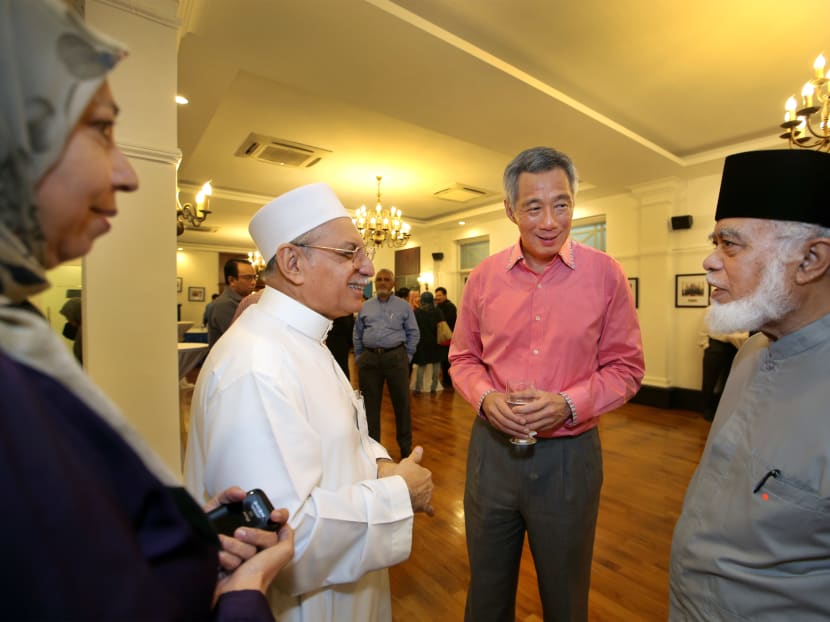Govt’s stance on tudung issue evolving, says PM Lee
SINGAPORE — The fundamental and much broader issue underpinning the debate about whether women should be allowed to wear the Muslim headscarf in frontline public service roles is about “what sort of society do we want to build in Singapore,” said Prime Minister Lee Hsien Loong today (Jan 25).
SINGAPORE — The fundamental and much broader issue underpinning the debate about whether women should be allowed to wear the Muslim headscarf in frontline public service roles is about "what sort of society do we want to build in Singapore," said Prime Minister Lee Hsien Loong today (Jan 25).
"It's a question which we faced right from Independence, in fact it's the reason why we became independent," Mr Lee said.
Speaking to reporters after a two-hour closed door dialogue with some 100 leaders and representatives from the Malay-Muslim community, Mr Lee reiterated that the Government's policy since Independence has been to build a multiracial society in which everyone has full and equal opportunities, and minority communities can live their way of life as well as practise their faith to the maximum extent possible, and not be oppressed or marginalised by the majority.
Mr Lee said he understood the Malay-Muslim community's perspective on the tudung. He also noted that the Government's position has not been static, with more statutory boards having corporate officers wearing the tudung.
But Singapore cannot take any precipitous changes, "especially in the aftermath of a hot and angry discussion", as this can lead to misunderstandings, he said.
Changes to the status quo should evolve gradually and in a broad and informal way, as attitudes and expectations change in society, and as people get used to new norms - instead of being pushed for in terms of rights and entitlements and to the detriment of the overall progress of harmony between the communities, Mr Lee said.
Asked how the Government could tell when it will be ready to allow Malay-Muslim women to wear the tudung in public service frontline roles, Mr Lee reiterated that the change needs to be evolved. "You never arrive. Over the last ten years we have gradually moved. Nobody has really noticed. I think that's really the way to go," he said.
"This is not the sort of thing where you want to put all your attention on this item and measure the progress of either racial relations or the progress of the Muslim community based on this one item," he added.
The issue has cropped up several times over the years. The public debate re-emerged in September last year after a polytechnic lecturer had asked at a forum on race why nurses were barred from wearing the Muslim headscarf. Prior to this, the tudung issue last surfaced in the public sphere in 2002 over primary schoogirls not being allowed to wear the headscarf in school.
This evening's dialogue was the first which Mr Lee had held with the Malay-Muslim community on the tudung issue since the public debate was re-ignited. Mr Lee said that he wanted to have a candid and heart-to-heart discussion with community leaders and representatives.
The session was also attended by Malay-Muslim MPs and Minister-in-charge of Muslim Affairs Yaacob Ibrahim, as well as several other Cabinet members — Deputy Prime Minister and Minister for Home Affairs Teo Chee Hean, Minister for Defence Ng Eng Hen, Minister for Law and Foreign Affairs K Shanmugam, Minister in the Prime Minister's Office Grace Fu, Acting Minister for Culture, Community and Youth Lawrence Wong — and other political officeholders including Senior Ministers of State Masagoes Zulkifli, Amy Khor and Indranee Rajah.
Echoing Mr Lee's point, Dr Yaacob, who is also the Minister for Communication and Information, said in response to reporters' question that the timing of when society will accept the wearing of tudung in public service frontline roles was not something that could be pinpointed. It is about "people's comfort level" and there is no "formula" for it, he added.
While Dr Yaacob noted that the aspiration of the Malay-Muslim community is clear - it wants to allow Muslim women to have the choice to wear the tudung at work - he said that the community leaders understand that the matter has to be seen within a wider context, instead of just as a single issue.
Mufti of Singapore Fatris Bakaram said that he hopes the day will come when everyone would be comfortable with Malay-Muslim frontline officers wearing the tudung. Asked whether he was convinced that society was not at that point yet, Dr Fatris said the Government has to "make the best decision at the moment that will not disrupt harmony". The Malay-Muslim community has to work hard to build a higher level of comfort with other communities, he added.
During the dialogue, Dr Fatris had apologised to Mr Lee on behalf of some members of the Malay-Muslim community, who had used harsh words online to attack community leaders and to "demonise" the Government, as the Mufti put it.
Dr Fatris told reporters: "I don't think that is part of our culture and identity. I wouldn't want the Government to have a misconception or misperception that the Muslims are becoming a community that do not uphold the sanctity of morality."
Moliah Hashim, Chief Executive Officer of Malay-Muslim self-help group Mendaki, said she also hoped that all Muslim women would be able to wear the headscarf at work one day. She added that there should be more discussions on the issue so that the community's aspiration could be met over time and there will be greater understanding all round on the matter.
Ang Mo Kio GRC Member of Parliament Intan Azura Mokhtar said that Malay-Muslim MPs like herself need to continue to engage the community as well as the broader society, over concerns and issues related to the headscarf, "so that we understand one another better".










